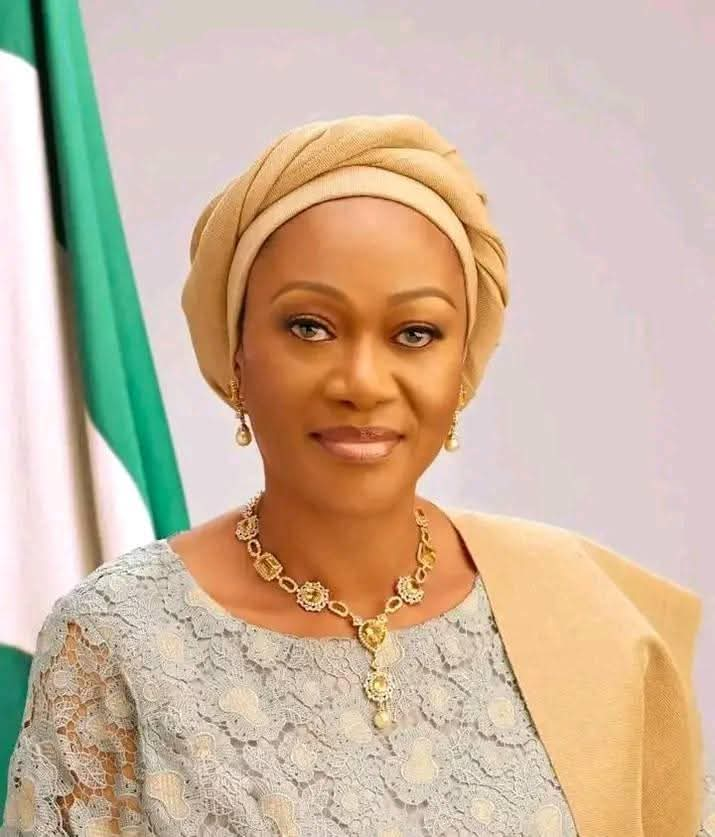
….commissions TB diagnostic machines
…FG integrates TB services into PHCs, targets 2030 elimination
The First Lady of the Federal Republic of Nigeria, Senator Oluremi Tinubu, has reiterated her unwavering commitment to eliminating tuberculosis (TB) in Nigeria by 2030, calling for increased domestic funding and collaborative efforts to achieve the goal.
Speaking through the Wife of the Kwara State Governor and Matron of the Northern Governors’ Wives Forum, Ambassador Olufolake Abdulrazaq, Senator Tinubu made this known during the commissioning of new molecular diagnostic machines on Thursday in Bwari Area Council, Abuja.
The diagnostic machines, procured under her Renewed Hope Initiative (RHI), are aimed at improving the timely detection and treatment of tuberculosis, especially in underserved communities across Nigeria.
The First Lady noted that the initiative was a fulfilment of her earlier pledge of ₦1 billion to support Nigeria’s TB response, made during the 2025 World TB Day outreach in Sauka, Federal Capital Territory (FCT).
“I am pleased to say again that this pledge has been translated into reality,” she said.
“Tuberculosis is curable, but far too many Nigerians are still dying from TB—not because there is no technology to detect the disease, but because access to diagnostic tools is limited.”
She stated that the diagnostic machines would be deployed to hard-to-reach and underserved areas, enabling rapid and accurate testing, thus reducing delays in diagnosis and curbing the spread of the disease.
“These machines represent more than just medical equipment. They are instruments of hope, tools of survival, and symbols of our collective commitment to end TB,” she added.
Senator Tinubu stressed the need for greater domestic resource mobilisation, urging all tiers of government, private sector players, and international partners to invest more in TB control efforts.
“Ending TB requires more than machines and medicines; it demands human, financial, technical, and political resources,” she said.
“As the global and national champion for TB, I assure you I will continue to advocate and lead the fight to end TB in Nigeria by 2030.”
She lauded the Federal Ministry of Health and Social Welfare, the National Tuberculosis and Leprosy Control Programme (NTBLCP), and Stop TB Partnership Nigeria for their relentless efforts and stewardship.
“Let us build a Nigeria where no life is lost to tuberculosis, where health is not a privilege but a right, and where our hope is both renewed and fulfilled,” she said.
In his remarks, the Coordinating Minister of Health and Social Welfare, Prof. Muhammad Ali Pate, applauded the First Lady’s intervention, describing it as “timely and strategic.”
“Her Excellency has delivered decisively. She is not just our national TB champion; she’s Africa’s regional champion and a global symbol of commitment to ending TB,” he said.
Pate said the Federal Government was already integrating TB services into the primary healthcare system under the Tinubu administration’s broader health sector reform.
“In just three months of 2025, over 46 million visits were recorded across primary health care centres in Nigeria. This tells us that trust in our health system is growing,” he noted.
“We are determined to improve diagnostic capacity, incentivise health workers, and ensure no Nigerian is left behind.”
Director of Public Health at the Federal Ministry of Health, Dr Godwin Ntadom, highlighted the improved turnaround time enabled by the new molecular diagnostic machines.
“We can now get test results in less than 30 minutes. This is a major leap from the previous system where patients waited days, sometimes weeks, for confirmation,” he said.
“This marks a turning point. The end of TB in FCT starts today.”
Ntadom revealed that despite the availability of free TB treatment in Nigeria, late diagnosis and low awareness continue to fuel TB-related deaths.
“Globally, there are over 11 million new TB cases annually, with about 1.3 million deaths. Nigeria bears the highest burden in Africa, detecting over 350,000 cases every year,” he said.
“Yet, many Nigerians are still unaware they have TB, and by the time they present at health facilities, it’s often too late.”
He commended the Renewed Hope Initiative for introducing diagnostic innovation that could drastically reduce delays and improve outcomes.
Also speaking, Dr Kumshida Balami, Medical Field Epidemiologist Coordinator for the Federal Capital Territory, World Health Organisation (WHO), said the commissioning reaffirmed Nigeria’s dedication to deploying innovation, equity, and resilience in tackling TB.
“These machines are proof of Nigeria’s resolve to lead the fight against TB in Africa,” she said.
“With strong political will, community engagement, and consistent collaboration, ending TB in Nigeria is not just a dream—it is a goal within reach in our lifetime.”
Dr Balami appealed to all stakeholders—government agencies, civil society organisations, private sector, and communities—to scale up interventions, leaving no one behind in the effort to “find, treat, and support” every TB-affected person.
The event was attended by representatives from the National Assembly, global development partners, health professionals, civil society groups, and beneficiaries of TB treatment.
The commissioning of the diagnostic machines is expected to strengthen the country’s health system response and bring Nigeria a step closer to ending tuberculosis as a public health threat by 2030.